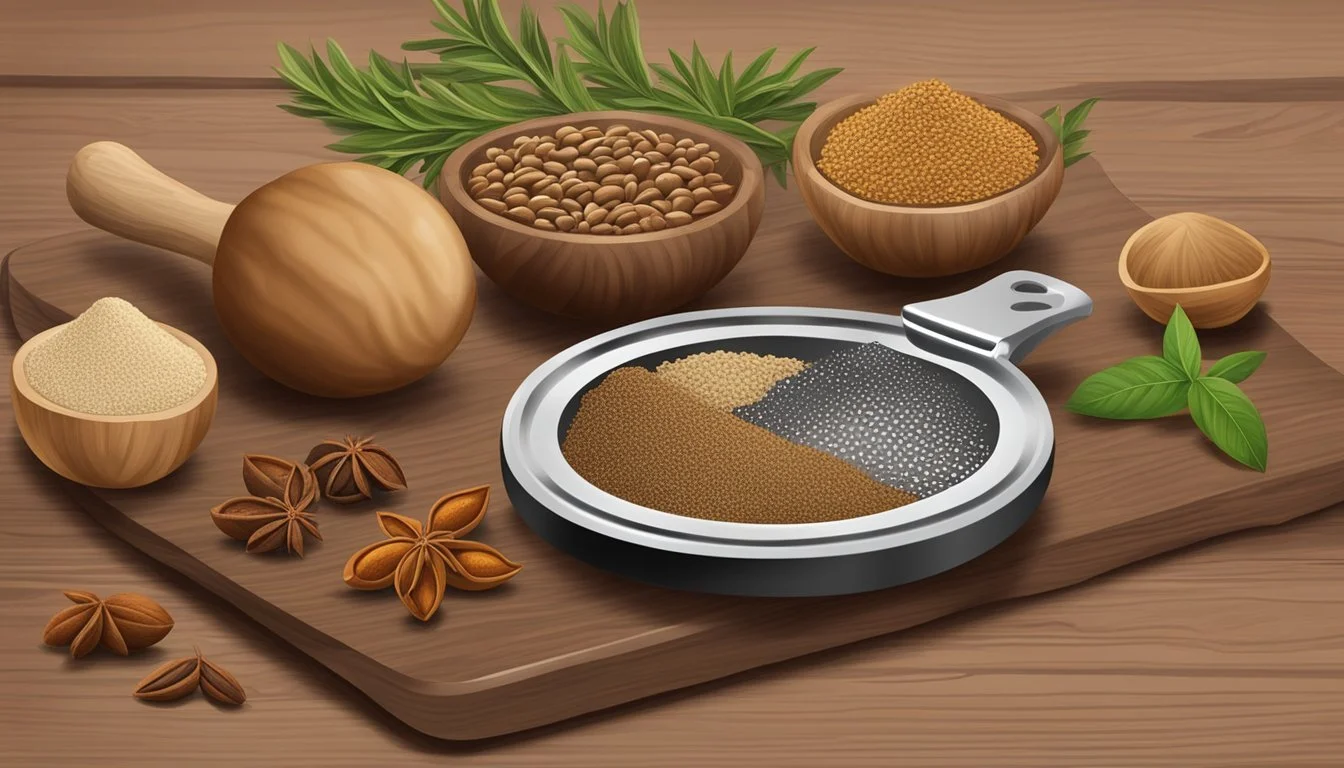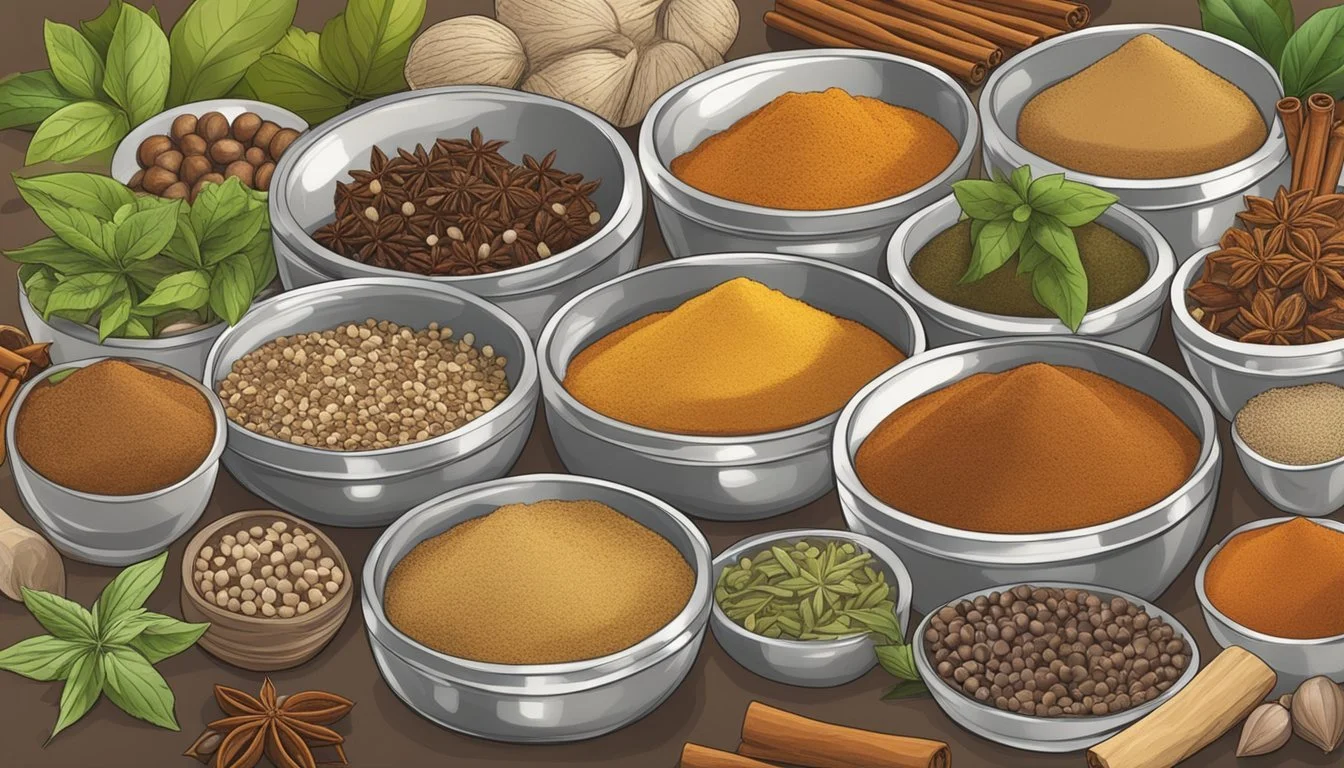Nutmeg Substitutes
Best Alternatives for Cooking and Baking
When you're in the kitchen and discover that you're out of nutmeg, finding a worthy substitute can save your dish from disaster. Several spices such as cinnamon, mace, and allspice can effectively replace nutmeg in your recipes. These alternatives not only bring their unique flavors but also add a similar warmth and aroma that nutmeg provides.
Cinnamon stands out as a popular alternative due to its widespread availability and comparable sweetness. Mace, the outer covering of nutmeg seeds, is another excellent option, offering a flavor profile closely related to nutmeg. For those who enjoy a more robust spice blend, garam masala or pumpkin pie spice can be great substitutes, especially in savory dishes.
By exploring these substitutes, you can continue crafting delicious meals without compromising on taste. Ginger and cloves also present viable options when a hint of spice and warmth is needed. Experimenting with these alternatives allows you to maintain the desired flavor of your dish, ensuring your culinary efforts are always rewarding.
Understanding Nutmeg
Nutmeg, derived from the seed of the Myristica fragrans tree, is a well-known spice with a rich, warm flavor.
Whole nutmeg is often preferred over pre-ground versions as it retains its potent flavor longer. Fresh nutmeg can be grated using a fine grater or a microplane to release its full aroma and taste.
Nutmeg's flavor profile includes sweet, nutty, and slightly peppery notes. It pairs well with both sweet and savory dishes.
In the kitchen, nutmeg finds its place in everything from baked goods like cakes and cookies to savory dishes such as stews and curry.
Key points about nutmeg:
Versatile spice
Warm, slightly peppery flavor
Used in sweet and savory recipes
Adding freshly grated nutmeg to your spice cabinet can elevate your cooking with more intense and aromatic results.
Common Uses of Nutmeg
Nutmeg is a versatile spice widely used in a variety of culinary applications. It adds warmth and depth to both savory and sweet dishes and enhances numerous beverages.
Savory Applications
Nutmeg plays a significant role in enhancing savory dishes. It is often used in meat dishes, helping to balance rich flavors.
One common use is in sauces such as Alfredo sauce, where it adds a subtle warmth to the creamy dish. Nutmeg also complements dishes like lasagna and shepherd's pie, where it provides an extra layer of depth.
In vegetable dishes, a hint of nutmeg can elevate the taste of spinach, potato dishes, and even stir-fried greens. It also pairs well with creamy soups, adding a balancing warmth to pumpkin or squash-based soups.
Sweet Pairings
Nutmeg shines in a range of sweet recipes, bringing warmth and complexity to baked goods.
In pumpkin pie, nutmeg is almost indispensable, contributing to its signature taste. It is also a key ingredient in spice cakes, banana bread, and muffins, where it enhances the overall flavor profile.
For festive occasions, nutmeg is often found in eggnog, providing a warm, spicy kick. Custards and puddings also benefit from a dash of nutmeg, transforming their flavor with just a small amount.
Beverage Enhancements
Nutmeg is not only for cooking and baking but also elevates beverages. A sprinkling of nutmeg can enhance the flavor of many warm drinks.
In teas and lattes, such as chai tea, nutmeg adds a warm, spicy note that complements other spices like cinnamon and cardamom. Hot chocolate and coffee drinks also gain a deeper flavor from a pinch of nutmeg.
Nutmeg's spicy warmth is also a popular addition to mulled wine and warm cider, making these beverages ideal for cold weather.
Top Nutmeg Substitutes
When you need a substitute for nutmeg in your recipes, there are several options that can convincingly stand in, each bringing its unique flavor profile. Here, we explore mace, pumpkin pie spice, and apple pie spice—each an effective substitute for nutmeg used in different culinary contexts.
Mace
Mace is one of the most effective substitutes for nutmeg, as it comes from the same fruit. While nutmeg is the seed, mace is the lacy aril that surrounds it.
Mace has a similar warm and aromatic flavor, with a slightly more intense taste. It works well in both sweet and savory dishes. Use a 1:1 ratio when substituting mace for nutmeg in your recipes. It is particularly good in baked goods, sauces, and even creamy soups.
This spice blend adds complexity to dishes without overpowering the palate. Its availability in ground form makes it convenient for precise measurement and integration in recipes.
Pumpkin Pie Spice
Pumpkin pie spice is a versatile substitute for nutmeg. It is typically a blend of cinnamon, ginger, nutmeg, allspice, and cloves.
Due to its composition, it can mimic the flavor profile of nutmeg quite closely. It's best used in sweet recipes like pies, cookies, and cakes. Add the same amount of pumpkin pie spice as you would nutmeg, but be mindful of the other spices in the blend.
This blend not only replaces nutmeg but also enhances your recipes with additional warmth and depth of flavor, making it a favorite for fall and holiday baking.
Apple Pie Spice
Apple pie spice is another excellent ground nutmeg substitute, commonly composed of cinnamon, nutmeg, and allspice.
It is primarily used in sweet treats like pies, muffins, and breads. Since it includes nutmeg, the substitution is straightforward and effective. Use it in a 1:1 ratio for nutmeg in your recipes.
The blend’s slight variation in flavor can add a unique touch to your dishes, while its mixed spices ensure a harmonious taste, making it a reliable alternative when nutmeg is unavailable.
Individual Spices as Substitutes
When you don't have nutmeg on hand, several individual spices can effectively take its place. These alternatives bring unique flavors to both sweet dishes and savory recipes.
Cinnamon
Cinnamon is one of the most popular substitutes for nutmeg due to its warm, sweet profile. Its woody flavor complements many baked goods and dessert recipes. You can use an equal quantity of ground cinnamon as a direct replacement for nutmeg. Cinnamon's versatility extends beyond sweet dishes; it enhances savory dishes like stews and curries as well.
Cardamom
Cardamom, known for its aromatic and slightly citrusy flavor, is another excellent substitute for nutmeg. Commonly used in Asian cuisine and teas, a small amount of ground cardamom can add an exotic touch to both sweet and savory dishes. Cardamom is potent, so start with less and adjust to taste. It's especially good in spiced cookies and cakes.
Cloves
Cloves, with their strong, pungent aroma, can be a powerful substitute for nutmeg. Ground cloves work well in baked goods that benefit from intense flavoring, such as gingerbread or pumpkin pie. They are also suited for savory dishes like roasts and stews. Because of their strength, it's best to use half the amount of cloves as you would nutmeg.
Allspice
Allspice, despite its name, is a single spice that mimics the combined flavors of cinnamon, nutmeg, and cloves. Predominantly used in Jamaican cuisine, it offers a sweet yet slightly peppery flavor. Allspice can be a one-to-one substitute for nutmeg, making it ideal for both sweet and savory recipes. Its versatility makes it a pantry staple for adventurous cooks.
Star Anise
Star anise, with its distinctive licorice flavor, serves as an intriguing substitute for nutmeg. Often used in Chinese cuisine, star anise brings a sweet, slightly spicy note to dishes. While it might not be suitable for all recipes, it can add a fascinating twist to certain baked goods and savory stews. Use sparingly, as its flavor can be quite strong.
By understanding the unique characteristics of each spice, you can choose the best substitute that complements your specific dish. Experimenting with these spices can lead to delightful and unexpected flavor combinations.
Concocting Your Own Spice Blends
Creating your own spice blends allows you to customize flavors to your liking and ensures freshness. Here are two popular spice blends, perfect for enhancing both fall and winter dishes.
Fall Spice Mix
A Fall Spice Mix includes warm, aromatic spices ideal for seasonal treats. Key ingredients often feature cinnamon, nutmeg, ginger, and cloves. These spices impart a cozy and comforting flavor, making them perfect for pumpkin pies, apple crisps, and gingerbread cookies.
Cinnamon: About 2 teaspoons
Nutmeg (or substitute): 1 teaspoon
Ginger: 1 teaspoon
Cloves: 1/2 teaspoon
Mix these spices together and store in an airtight container. This blend is also excellent in coffee or sprinkled over oatmeal.
Winter Warmer Blend
The Winter Warmer Blend emphasizes strong flavors like allspice, cloves, and sometimes peppercorns. This makes it ideal for savory winter dishes such as stews, roasted meats, and mulled wine.
Allspice: 1 teaspoon
Cloves: 1 teaspoon
Cinnamon: 1 teaspoon
Nutmeg (or substitute): 1/2 teaspoon
Peppercorns (optional): 1/4 teaspoon
Combine these specific spices to create a batch that will stay potent throughout the winter months. This blend adds depth and complexity to any dish it's added to, ensuring that meals are flavorful and warming.
Considerations When Choosing Substitutes
When selecting a nutmeg substitute, it's essential to consider the flavor profile. Nutmeg has a warm, slightly sweet, and aromatic taste, which contributes depth to both sweet and savory dishes.
Availability is another factor. Spices like cinnamon and cloves are typically common in most grocery stores, making them convenient and cost-effective options.
Strength of the substitute matters. Cloves are stronger than nutmeg. Use about half the amount to avoid overpowering your dish. For example, if a recipe calls for 1 teaspoon of nutmeg, use 1/2 teaspoon of ground cloves.
Application is crucial. Some substitutes, like garam masala, work better in savory dishes due to their complex mix of ingredients. Others, like cinnamon, are versatile and can be used in both sweet and savory recipes.
Nutmeg Substitute Ideal Use Amount to Use Cinnamon Sweet and savory dishes 1/2 to 3/4 teaspoon Ground Cloves Both, use sparingly 1/2 teaspoon Garam Masala Savory dishes 1 teaspoon Mace Similar to nutmeg, diverse use 1:1 ratio with nutmeg
Cooking substitutes should complement other ingredients. Consider how a substitute will mix with main flavors. For instance, allspice adds a hint of pepper, making it suitable for more robust recipes.
Sourcing and Storing Substitutes
When looking for spice substitutes for nutmeg, sourcing high-quality ingredients and storing them properly are crucial. Understanding where to buy and how to store these substitutes can ensure that your spice cabinet is always stocked and ready for use.
Buying Tips
When it comes to finding nutmeg substitutes, consider both local and online sources.
Local grocery stores often carry a variety of spice blends like garam masala and pumpkin pie spice. Specialty spice shops also offer unique options that might not be found in regular stores.
When buying whole spices such as cloves or cinnamon sticks, opt for fresh whole nutmeg whenever possible. These can be ground at home for maximum freshness.
For convenience, ground spices are widely available, but always check the expiration date to ensure potency. Online retailers provide access to a wider range of spices, including some rare finds.
Reading customer reviews can help in selecting the best quality products.
Storage Solutions
Proper storage extends the life of your spices, maintaining their flavor and potency.
Store both whole and ground spices in airtight containers to protect them from air and moisture. Glass jars with tight seals are ideal.
Keep these containers in a cool, dark place such as a spice cabinet or pantry. Avoid exposure to direct sunlight and heat sources like stovetops or ovens.
For whole nutmeg, consider using small airtight bags within a jar to provide double protection.
Label each container with the purchase date. Rotate older spices to the front of your cabinet to use them first, ensuring a steady cycle of fresh ingredients.
By adhering to these storage practices, your spice blends and substitutes will retain their quality for longer periods.
Nutritional and Dietary Considerations
When considering nutmeg substitutes, it's important to evaluate their nutritional content and how they fit into your diet.
Nutritional Profile
Below is a general comparison of the nutritional profiles of selected substitutes for nutmeg per 1 teaspoon (approx. 2 grams):
Spice Calories Carbohydrates Fiber Fat Protein Calcium Iron Nutmeg 12 1.1 g 0.5 g 0.8 g 0.1 g 4 mg 0.3 mg Cinnamon 6 2.1 g 1.4 g 0.03 g 0.05 g 26 mg 0.2 mg Cloves 6 1.4 g 1.1 g 0.27 g 0.1 g 12 mg 0.2 mg Mace 6 1.0 g 0.5 g 0.3 g 0.1 g 4 mg 0.2 mg
Dietary Considerations
Some nutmeg substitutes, like mace, come from the same tree and have similar nutritional profiles. Others, such as cinnamon and cloves, offer distinct flavors and nutritional benefits.
Cinnamon is rich in antioxidants and has anti-inflammatory properties. It's known to help regulate blood sugar levels, making it suitable for people with diabetes.
Cloves contain nutrients like manganese, which supports bone health and metabolic function. They also possess antimicrobial properties.
Allergies and Sensitivities
Individuals with nut allergies should exercise caution. While nutmeg comes from seeds and is generally safe for those with nut allergies, its substitutes need careful evaluation. Always check for potential allergens in blends like garam masala, which can include various spices.
Health-conscious individuals might prefer spices with added benefits:
Cinnamon for its anti-inflammatory and blood sugar regulation properties.
Cloves for their antimicrobial effects and nutrient density.
Choosing a nutmeg substitute isn't just about flavor. It's also about integrating nutritional benefits and dietary needs tailored to personal health goals.
Cultural and Regional Variations
Nutmeg substitutes vary significantly by region, influenced by local cuisines and available spices. Cultural traditions play a crucial role in these variations, incorporating unique flavors and spice blends that offer distinct alternatives to nutmeg.
Asian Influence
Asian cuisine often highlights the use of complex spice blends.
Garam Masala, a staple in Indian cooking, includes ingredients such as cumin, coriander, mace, cinnamon, cloves, and nutmeg.
This blend pairs well with savory dishes, offering a rich and multifaceted flavor profile that mimics the warmth of nutmeg. In Southeast Asian cuisine, galangal might also be used as a substitute, providing a sharp, citrusy note.
These spices are integral to curries, stews, and sauces, demonstrating the region's preference for robust and aromatic flavors.
Middle Eastern Flavors
In the Middle East, spice blends play a central role in culinary traditions.
Baharat is a common blend that can substitute for nutmeg, combining black pepper, coriander, cinnamon, cloves, cumin, and allspice. This blend adds depth to meat dishes and stews.
Sumac, while not a direct substitute, imparts a tangy and slightly astringent flavor that can complement dishes featuring nutmeg, particularly in spice rubs and marinades.
These ingredients highlight the Middle Eastern love for bold, layered flavors that enhance both sweet and savory preparations.
Caribbean Spices
Caribbean cuisine often incorporates rich and spicy seasonings.
Allspice, native to Jamaica, is a commonly used spice that can stand in for nutmeg with its sweet and peppery notes. Jamaican Jerk seasoning often includes allspice along with cinnamon and nutmeg, adding complexity to meat and seafood dishes.
Pimento, another name for allspice, plays a critical role in Caribbean cooking, enhancing the flavor of stews, sauces, and even desserts, reflecting the region's vibrant and diverse spice palette.
European Traditions
European cooking, especially in northern regions, often relies on warming spices.
Cinnamon and cloves are popular nutmeg substitutes, frequently used in baked goods and desserts. Mace, the aril of the nutmeg seed, offers a similar flavor but is slightly more delicate and fragrant, making it suitable for pastries and creamy sauces.
In traditional British and Irish cuisine, these spices are commonly found in pudding, custards, and fruit pies, reflecting a preference for comforting and aromatic flavors.
By understanding these regional variations, one can appreciate the diverse culinary landscapes that influence the choice of nutmeg substitutes worldwide.








